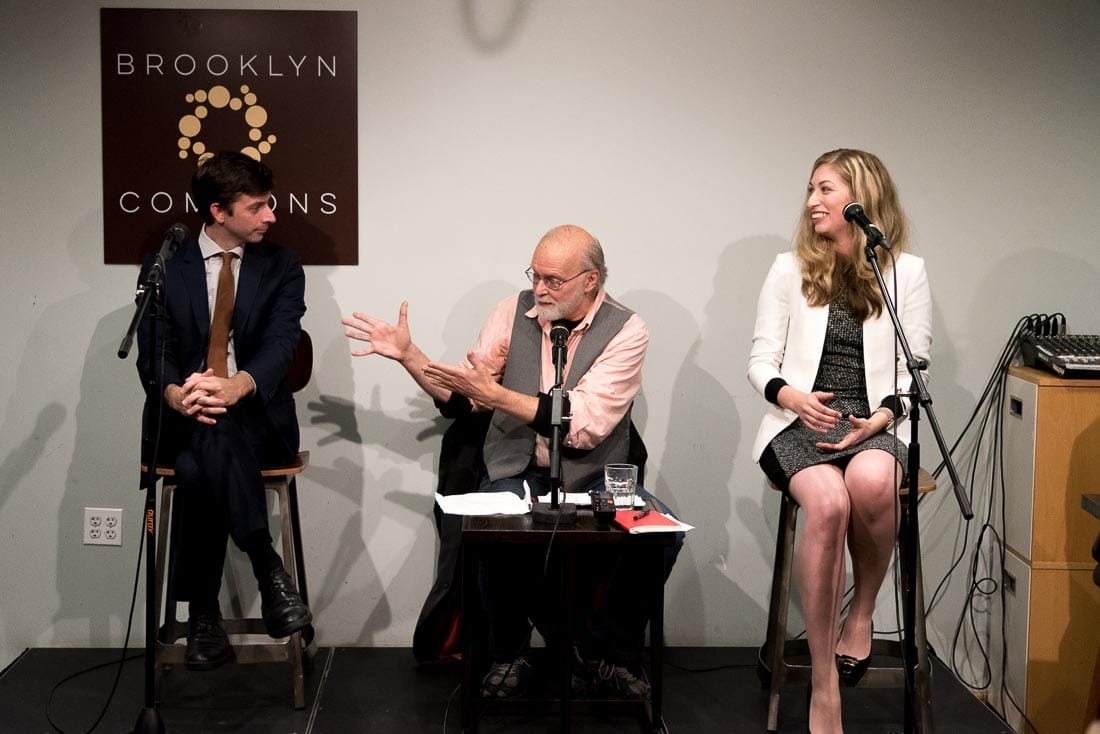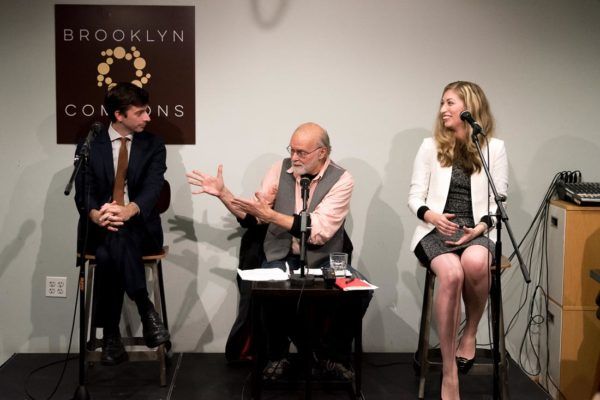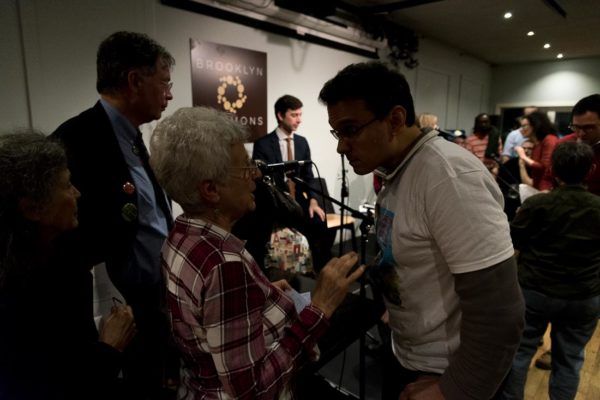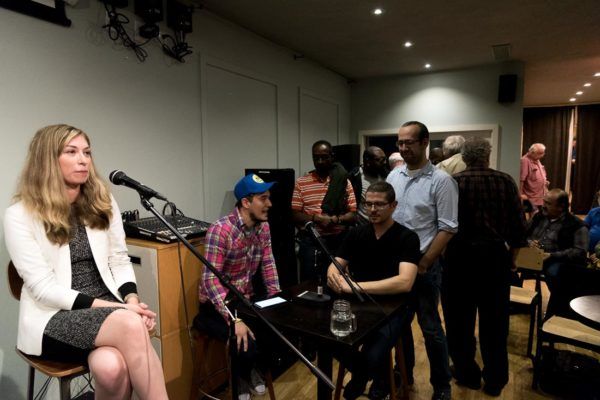Park Privatization, School Segregation & Sale of Libraries Dominate 33rd Council District Debate


BOREUM HILL – Last night, City Council member Stephen Levin, the Democratic incumbent, faced off in a debate against his challenger, Victoria Cambranes, of the Progress for All Party in a debate hosted by Mitchell Cohen of WBAI radio at the Commons Cafe.
Levin has served two terms as a City Council member representing the 33rd District, which includes parts of Boerum Hill, Brooklyn Heights, Brooklyn Navy Yard, Downtown Brooklyn, Dumbo, Fulton Ferry, Greenpoint, Vinegar Hill, and Williamsburg. Cambranes is a Greenpoint native making her first challenge for public office.
The event was live-streamed with video of the entire debate available via the Commons Cafe. The following takeaways have been condensed for clarity and time.
Would the candidates support Ben Kallos’ legislation to ban pesticides from city parks?
Levin responded, “I’ll do it tomorrow,” promising to co-sponsor the bill on Monday. He cited his experience fighting for the environment, banning the transport of fracking wastewater and getting PCBs out of schools.
Cambranes said that, if elected, she would sponsor the legislation as well, citing other health concerns in the district, like pollution from the BQE as a reason to “do more.”

Is the project at 80 Flatbush a good or a bad idea? How can we find a balance between preserving neighborhoods while pushing for growth and development in New York City?
Levin said he hasn’t come to a conclusion on 80 Flatbush yet, but that “there are problematic elements for sure.” The councilmember outlined some of the zoning regulations that make the project a difficult one, but was cut off by the two-minute limit for responses.
“As proposed, I don’t think it’s acceptable, right now, but this is something we have to have a community discussion about,” he concluded.
Victoria Cambranes denounced the project and stated that allowing schools to fail so that they can be snapped up by developers is the wrong way to sell public assets—which elicited a strong response from those gathered.
Though Cambranes suggested using District 15 funding for new schools to repair the school in question instead of allowing developers like Alloy to advertise themselves, Levin countered—he’d raised that same point in early meetings, but rules on where tax money can be allocated prevented that option.
Is the sale of public libraries—specifically the Brooklyn Heights Library—a proper use of public land?
The sale was clearly unpopular with those in the room and Levin quickly explained the sale “was not something I came up with,” but described it as a necessary move due to a $300 million capital needs shortfall throughout the Brooklyn Public Library system. The councilmember admitted he “was not thrilled” having to approve the proposal, but found “it was the responsible thing to do for the entire borough of Brooklyn.”
“The problem with the Brooklyn Heights Library being sold is this: it’s another public asset being sold for pennies on the dollar to the great detriment of the community which needs these libraries—at a time when New York City is not short on money,” Cambranes countered.

On education, a question was posed concerning access to resources for education by low- and middle-income students as charter schools are being built within public schools and high-rise developments. The 33rd District covers District 13 and 15 schools.
Councilmember Levin pointed to his role in establishing the Downtown Brooklyn Schools Working Group to work against segregated schools in District 13. “We’re pushing the De Blasio administration to do better, we’re breaking down racial and ethnic lines when it comes to our school, and we’re making sure all children have access to the best educational resources not just within any school district but in the entire city.”
Cambranes agreed on pushing the De Blasio administration to do more. “I believe that charter schools that cohabitate within public schools allow for a ‘poor door,’” she added, denouncing a “culture of segregation” that exists not only in schools but in housing as well. She spoke generally of a need for innovative thinking when it came to addressing underfunded schools instead of relying on public-private partnerships.
On follow-up, Levin explained that the State approves charter school applications, not the city, and called charter expenditures “totally out of control.”
Cambranes suggested buying land for schools from the Catholic church, and the religious schools she said are in decline, closed or lying vacant.
Would the candidates sponsor the Small Business Jobs Survival Act (SBJSA)? (The SBJSA would grant commercial tenants increased rights in renegotiating commercial leases, including 10-year minimums and third-party arbitration. The bill has been in committee for the last 30 years.)
Cambranes answered that, if elected, she would support the SBJSA, decrying the closure of mom and pop shops in Brooklyn and the revolving door of businesses that fail due to rent increases.
“I’m proud to be a co-sponsor of the Small Business Jobs Survival Act,” Levin answered, “It’s the right legislation to pursue.”
Levin explained that the reason the the SBJSA hasn’t been passed in 30 years is due to concerns from lawyers at the council about the legality of the bill. However, he thinks it’s time to pass the bill.
“To be honest with you,” said Levin, “My opinion is: let people sue about it. Let’s pass the bill… It’s the right thing to do now.”
The councilmember cited the closure of Jesse’s Deli as an effect of gentrification on family-owned business in the neighborhood and said he’d like to reform commercial property tax, an expense landlords often pass on to commercial tenants.
Cambranes attacked the entire city council for not passing the bill sooner, dismissing their reasoning—doubts about the bill’s ability to hold up in court—as political theater.
Levin stated he would be willing to make support of the SBJSA an issue in the selection of the next City Council speaker.

How do we get the parks back in the hands of the parks department and push back against the concept of privatization?
Answering first, Cambranes cautioned against “selling out” to corporate interests, calling the ferry link “disgusting,” and claiming there was “a lot more that could’ve been done” in Brooklyn Bridge Park to fight back against development, but didn’t elaborate as to what that was.
“My record bears out that I stand up for public spaces,” Levin responded. “I’m a member of the board of Brooklyn Bridge Park and I’ve voted against every single private development every single time—that is my record.”
As the night proceeded, Cambranes began to attack Levin more directly, often cutting off his answers, increasingly sarcastic and combative in her answers. The crowd at the Commons applauded many of her criticisms of Levin, but her most concrete suggestion of the night, in regards to finding new money outside of public-private partnerships or development, was to “host a bake sale in Union Square.”
The election will take place Tuesday, November 7th.




